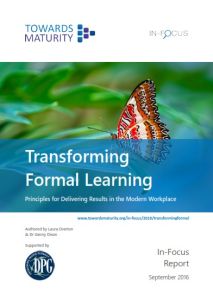Join getAbstract to access the summary!

Join getAbstract to access the summary!
Laura Overton and Jenny Dixon
Transforming Formal Learning
Principles for Delivering Results in the Modern Workplace
Towards Maturity, 2016
What's inside?
Technology is changing the way people learn, but that doesn’t mean it’s time to shelve formal learning yet.
Recommendation
In today’s business world, many employees are taking the reins when it comes to gaining new skills and knowledge. But what role do employers play in ensuring their employees flourish? And how does technology fit in? In a Towards Maturity analysis, sponsored by Developing People Globally, Laura Overton and Genny Dixon discuss why formal learning will remain a core component of the learning process. getAbstract recommends this summary to all HR professionals, business leaders, learning consultants and workplace educators.
Summary
About the Authors
Laura Overton is the managing director at Towards Maturity, where Genny Dixon, PhD, is the head of research.
























Comment on this summary